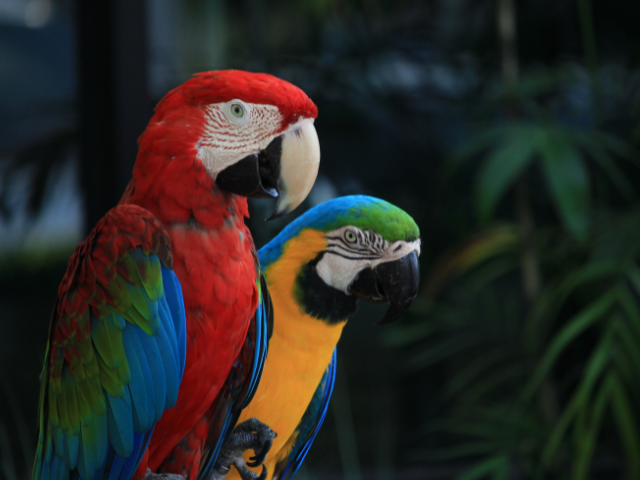A Warning Sign for Our Planet

Tropical parrots, key seed dispersers and pollinators, highlight the biodiversity at risk as climate change accelerates bird population declines.
Why Tropical Birds Matter
When we think of the tropics, we often picture the sounds of colorful birds echoing through lush forests. From toucans and parrots in South America to hornbills in Asia and turacos in Africa, tropical birds are more than just symbols of beauty, they’re vital to keeping these ecosystems alive.
But new research published this week in Nature Climate Change delivers sobering news: tropical bird populations are collapsing. In many regions, numbers have dropped by more than half in just 30 years. These declines are warning signals that the ecosystems we all depend on are under threat.
The Study at a Glance
- Published: August 2025
- Source: Nature Climate Change
- Finding: Many tropical bird species have lost more than 50% of their populations over three decades.
- Causes: Deforestation, climate shifts, habitat fragmentation, and food scarcity.
Researchers analyzed decades of data from South America, Africa, and Southeast Asia. The breadth of the study makes it one of the strongest indicators yet of how climate change and human activity are reshaping entire ecosystems.
Why This Matters Beyond Birds
It may be tempting to think of this as a bird problem, but in reality, it’s a human problem. Birds play critical roles in the health of tropical forests. Many tropical plants rely on birds for pollination, making them essential partners in sustaining rainforest ecosystems. Birds also serve as seed dispersers, carrying seeds across vast distances and helping forests regenerate after storms, fires, or human disturbance. In addition, they act as natural pest control by consuming insects, which reduces crop damage and lowers the risk of diseases spreading.
If these birds vanish, the balance tips. Forests struggle to regenerate, pests multiply, and ecosystems weaken, leading to ripple effects that reach people everywhere. Think of birds as the “canaries in the coal mine” of the tropics. Their decline signals deeper problems unfolding quietly but rapidly.
What’s Driving the Decline?
The study highlights several overlapping causes:
- Deforestation: Vast areas of tropical forest are cleared each year for farming, logging, and development. Birds lose nesting sites and food sources.
- Climate Change: Rising temperatures disrupt breeding cycles, while shifting rainfall patterns reduce insect and fruit availability.
- Habitat Fragmentation: When forests are broken into small, isolated patches, bird populations struggle to survive.
- Direct Human Pressure: Hunting and the pet trade further threaten vulnerable species.
Together, these pressures create a perfect storm, pushing many species toward decline faster than conservation measures can keep up.
Lessons for the Rest of the World
What happens in the tropics doesn’t stay in the tropics. Healthy forests regulate Earth’s climate by absorbing massive amounts of carbon dioxide. Without birds to keep these forests resilient, the planet’s ability to fight climate change weakens.
In other words: when tropical birds decline, so does one of our best natural defenses against global warming.
Hope in Action
While the data is troubling, the study also points toward hope. Around the world, conservation efforts have proven effective when communities, governments, and organizations work together.
- Protected Areas Work: Expanding reserves and enforcing protections stabilize bird populations.
- Reforestation Efforts: Planting diverse native trees provides food and shelter.
- Community-Led Conservation: When local people are empowered to steward forests, biodiversity thrives.
- Climate Action: Reducing greenhouse gas emissions protects fragile ecosystems long-term.
Small victories are already happening. In Costa Rica, large-scale reforestation has allowed once-declining bird populations to rebound. Similar projects in Indonesia and parts of Africa show that recovery is possible with the right support.
What You Can Do
The tropical bird crisis may feel far away, but every choice we make has global consequences. Here are practical ways to help:
- Support conservation groups working in tropical regions.
- Choose sustainably sourced products like certified coffee or wood.
- Advocate for strong climate policies in your community and beyond.
- Reduce personal carbon footprints through energy choices and transportation.
Even small actions add up. Just as a single bird can carry seeds that grow into a new forest, one person’s choices can contribute to a healthier planet.
Birds keep forests alive, and forests keep our planet stable. If they falter, so do we. By protecting habitats, addressing climate change, and supporting conservation, we can ensure that the forests remain full of life, and that their songs continue for generations to come.
Source: Goldwert, D., Patel, Y., Nielsen, K. S., Goldberg, M. H., & Vlasceanu, M. (2025). Climate action literacy interventions increase commitments to more effective mitigation behaviors. PNAS Nexus, 4(6), pgaf191.
